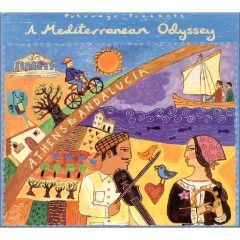Featured Stories
Putumayo: Bringing Home the Music of the World for 26 Years
bIf you’ve ever stepped into OB People’s Coop or waited in line under the mermaid for your Caramel-Frappo-Ocasio-Cortez-Americano-Latte, you’ve probably noticed the simple, almost childlike artwork of certain CDs, with its rich colors of amber, ocher, and burgundy. They remind you of your sister’s Guatemalan shawl, reduced down to a crisp 5″ x 5″ square. You’ll see titles like Ska Around the World and Arabic Beat. There are more, lots more, with music from all over the world. You have just made the first step in discovering the sensation of the CDs by Putumayo.
For the last 26 years Putumayo has been packaging up music from far-flung places such as Peru, Zambia, Russia, and just about every place in between. This musical masala is the vision of entrepreneur Dan Storper, who might be one of the few people who could be described as a citizen of the world.
The record label has its beginnings as a retail store in New York City, during the mid seventies. Storper sold craft items from South America: tapestries, rugs, baskets, and even some artifacts that were hundreds of years old. The shop also featured clothing. The mix proved to be popular with the well to do and celebrities. The store’s shoppers included Joni Mitchell, Cher, Goldie Hawn, Marlo Thomas, and even Redd Foxx.
Expanding to a half dozen stores, music was not on Storper’s mind until the day he was at a Putumayo outlet and was assaulted with the pounding beat and screaming guitars of heavy metal music. He needed something more appropriate for his shoppers.
He checked out different kinds of music but couldn’t find anything that was appropriate. Then he remembered being charmed by the Nigerian juju band Kotoja and how they mixed traditional African music with American rhythm and blues at a concert he had recently attended in San Francisco “What struck me was how the music was bringing all these different people together—some dancing the twist, others doing their own thing. It was such an odd mix of people and dancing, and I loved it,” Storper told Karen Rutter from the Cape Times in South Africa in 2008.
Storper collected similar music and started playing world music in his stores. As soon as the sound of the first djembes and ouds were heard among the aisles of his Putumayo outlets folks started asking where they could buy the intriguing music. Not to let an opportunity pass by, Storper contacted Richard Foos, who was president of Rhino Records at the time. The two went to work on putting together and selling compilation CDs. Soon two CD compilations were being offered for sale in Putumayo stores.
He continued making the compilations, and, in 1997, Storper sold his clothing company to concentrate on the music and CDs. The beginning was rocky. This was a time when the recorded music industry was suffering an implosion. Putumayo suffered major losses in the first four years as an independent record company. Bankruptcies of several major retailers beginning in 2000 left Putumayo with unpaid debts.
By 2002, however, things turned around for the label. With some reorganization and reining in of expenses, the company realized its first profitable year, with sales of $10.8 million and earnings of almost half a million dollars. While the rest of the music industry continued into decline, Putumayo gained greater and greater success.
The latest compilation from Putumayo is Acoustic Women, featuring women musicians from around the world. Among the artists is Fernanda Cunha, who likes to explore the musical affinities between Brazil and Canada, where she makes her home. Stine Michel is a Danish performer of children’s music, who is not the slightest bit condescending in her approach. Canan Uzeril, a German, puts pop rhythms and sensibilities to the music of her Turkish roots.
Although the music comes from all over—Europe, South America, Africa, and even Louisiana—there is a unifying quality to the music. Putumayo’s compilations have been noted for their upbeat quality and being easy on the ears. Their CDs feature “music that is guaranteed to make you feel good,” Storper has said.
“We go through an exhaustive filtering process to select the tracks for our albums,” according to Storper. “While each album is based on a particular theme or geographical area—like acoustic music from Africa or a Latin groove—there’ll be a common approach to the choice of songs. I call it the ‘spirit of Bob Marley.’ It guides us to find songs that are universal and that can appeal to people of all ages and backgrounds. We’ve tried to find that place where someone my parents’ age and someone, you know, if I had a kid who was 17, could dig the same music,” said Storper when he spoke to Anthony Broadman of the Arizona Daily Star in 2003.
Storper hopes that by folks getting a taste of this and a smattering of that, he is introducing them to musicians whom they may not otherwise hear. “The thing is that a lot of these artists have struggled for recognition,” he said to Karen Rutter. “If somebody hears them and wants more, then we’ve done a small thing to help. And if the right person hears a song at the right time, anything can happen.” He hopes that these listeners will also be inspired to seek out the records of these artists on their labels.
Storper was born to be an entrepreneur. When he was seven years old, his grandfather gave him some brushes to sell to neighbors. The youngster raided his father’s closet, loaded his father’s suits in his wagon, and tried to sell them to neighbors as well. Despite the criticisms of “being The Man” by his fellow students, he sold records and posters out of his dorm room while he was in college at Washington University in St. Louis.
Putumayo has its detractors. The formula of finding music pleasing to mom, dad, grandma, and all the grandkids leads many to complain that the label distributes music that, while seemingly exotic, is at its core blandly mainstream. Some say that the label relies on music that is heavily influenced by American pop, rock, and jazz, resulting in music that is not really exotic at all.
For every detractor, however, Putumayo has dozens of ardent supporters. “I can pick a genre. I choose the albums that speak to my personal heritage, like my Irish background,” says San Diegan Rachel Couch.” And I can imagine that I’m in these places of the world.”
Music lovers who had come of age in the sixties and seventies were left in a quandary with the advent of CDs. The rich experience that album covers had provided for decades was gone, or at least reduced. The album covers of 12-inch records gave you 144 square inches of artwork, which record companies became more than willing to oblige. Once these images were squeezed down to less than one fifth the size, what was there? Try to distinguish the 153 individuals on the cover of Sergeant Pepper’s. You can’t. Once the comments by Nat Hentoff and Ralph Gleason were reduced to four-point type, forget about reading the liner notes.
Putumayo knows that small art is still good art, but it has to be designed small.
Since 1993 every CD cover has been designed by Nicola Heindl. It’s part of what makes you know that you have a Putumayo recording. The artwork has been described as “ambiguously ethnic.”
Some folks consider Putumayo unique, but world beat music has been around forever. It may not have always been called world beat, but folks have always been drawn to exotic music. Baby Boomers will remember the faux exoticism of Martin Denny and his imaginary Pacific Island villages. There was also the Italian pop craze that produced the hits of Dean Martin and Domenico Modugno with songs like “That’s Amore” and “Volare.” Harry Belafonte cashed in on calypso. The African beats of Miriam Makeba and Hugh Masakela dominated pop charts in the U.S. during the sixties. And don’t forget how Brazilian bossa nova took over the airwaves.
U.S. pop stars also incorporated, appropriated, and outright stole music from overseas. Talking Heads front man David Byrne, grabbed music from all over the globe. Paul Simon might be considered the most accomplished of the multicultural musicians. Simon has dived into reggae, South African music, and South American music.
Storper hopes that his packages of world music not only expose listeners to new music from around the globe, but also that his compilations of world music can help unify this planet. “One of the things that was so appealing about the music I was finding is that is came out of cultures where there’s a lot of suffering, poverty, disease, and war,” he said to Anthony Broadman. “And yet they’ve found ways, over and over again, to be joyous and dance and have a good time, even though times are tough.”

















